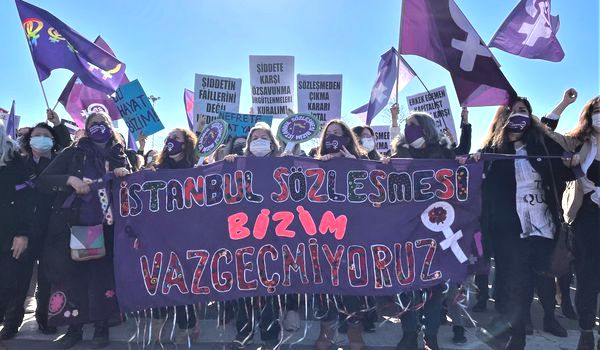On 20 March 2021, Turkey withdrew from the Istanbul Convention with a presidential decree announced in the Official Gazette at midnight. The Council of Europe Convention on preventing and combating violence against women and domestic violence, better known as the Istanbul Convention, is a human rights treaty aiming at prevention of violence, victim protection and to end the impunity of perpetrators. As the first country to sign and ratify the convention, the withdrawal of Turkey created a shockwave not only in Turkey but also in Europe. For the feminist activists in Turkey this move was expected but still shocking. Back in July 2020, the longstanding efforts of Islamic sects and male groups to withdraw from the Convention was embraced by the government and it eventually created a public debate on the convention. Months later, without any prior notice the decision for the withdrawal from the convention was announced and declared in the official statement that “the convention deviated from its aim because it was manipulated by the marginalized groups”. The illegitimacy of this decision forced them to hide behind false claims that would echo in public opinion. Anti-LGBTI+ discourse and the outcry for the dismantling of families were used to justify the decision.
AKP’s family oriented policies
Many feminists in Turkey have always been critical about the AKP (Justice and Development Party) ruling since 2002 — government’s policies on women and campaigned against the family oriented policies imposed in political discourse as well as in public policies. Although AKP signed and ratified the Istanbul Convention in 2011, strengthening the family has always been the primary agenda for them. 2011 marks the year in which the Ministry of Women was changed into the Ministry of Family and Social Policies. Erasing women from the name of the ministry was not only a symbolic gesture but also a sign of the concentration on family oriented policies and how it will dismantle the implementation of the convention and domestic laws.
The anti-women stance of President Erdoğan is widely known since he frequently shares his thoughts about women. For example, in 2010, he had stated that he did not believe in equality between women and men due to their dispositions and repeated this argument many times over the years. In 2014, he used “fıtrat”, an Arabic word with Islamic roots which describes the ‘pure’ and ‘natural’ human disposition. By using this word, he naturalizes gender roles as if these were an unchangeable law. This happened in the years in which Turkey stated its commitment for the Istanbul Convention, and shows that there was no political will to implement it. The very basic principle of preventing and combating violence against women is recognizing that, as it is emphasized in the convention, it is a manifestation of historically unequal power relations between women and men and family is the core institution in which unequal relationships are reproduced. Thus, the strong focus on family oriented policies and ignoring gender inequality cause the misinterpretation and insufficient implementation of the existing laws and conventions.

